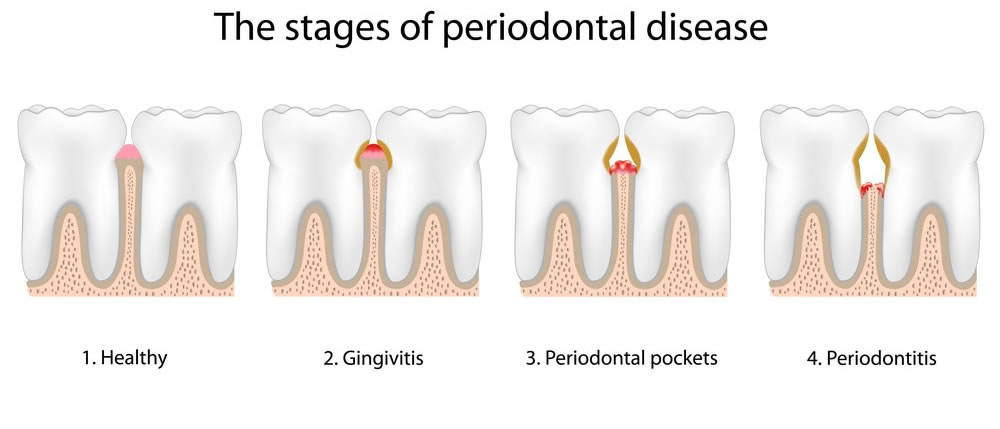Periodontal disease is a serious condition where the bone and supporting structure around the tooth is damaged and lost over time.
This is due to a long-standing bacterial infection. If left untreated teeth can become loose, painful and abscessed and usually need extraction.
Periodontal disease is the term given to a range of teeth and gum conditions from Gingivitis to more serious Advanced Periodontitis.
Periodontal disease increases risk factors for systemic medical conditions like diabetes, heart attacks and strokes and is one of the more common diseases of Australian adults.
Unfortunately it is painless in the early stages. Unless you are diagnosed early and start taking steps to manage the disease, it can be hard and expensive to control. Once diagnosed you should not ignore periodontal disease as it can lead to more serious problems.
Who is at risk of periodontal disease?
The following risk factors have been identified:
- smoking
- diabetic
- high blood pressure
- family history of periodontal disease
- poor general health
How can I tell if I have periodontal disease?
Common Signs and Symptoms include:
- Bleeding, inflamed, spongy gums
- Wobbly teeth
- Teeth changing shape/ moving / gaps appearing between teeth
- Toothache
- Bad breath
- Bad taste in mouth
- Abscesses
- Fit of the denture has changed
- Bright red gums
- Tender gums
- Bleeding gums while brushing, flossing or eating
- Receding gums
We test every single patient for periodontal disease as standard protocol. We use a periodontal probe, which measures the depth between the tooth and the gum.
How do you get periodontal disease?
Usually, periodontal disease begins because a person hasn’t managed to remove enough of the bacteria (we call it plaque or a biofilm) to stop their immune system overreacting.
If your immune system flares up, inflammation sets in and the build-up hardens around your teeth. This build-up of plaque, calculus and bacteria can become more aggressive and do more damage, attacking bone and gums unless it’s reversed.
Treatment
Treatment depends on how severe your case of periodontal disease is. For the mildest form, you might just need to change the way you clean your teeth, have a thorough check up and clean, or perhaps use different toothpaste.
For long-standing or more severe disease, our dental hygienist may need to perform an especially thorough type of cleaning (not just a scale and clean).
There are particular ways to brush, floss or “picksters” your teeth to reverse gum disease. Your dental hygienist or oral therapist will show you how to care for your teeth and gums (including brushing and flossing), and schedule a follow-up appointment to make sure the disease progressed.
If you have advanced periodontal disease, you may need a referral to a specialist, or surgery to halt its spread

